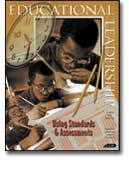Safe to Be Smart
Safe to Be Smart by Anne Wheelock. Columbus, Ohio: National Middle School Association, 1998.
What are the implications of the standards movement for schools? Wheelock's premise is that simply "teaching to the standards" is not sufficient. Rather, schools must develop cultures that support standards-based reform. Such a culture reflects a deep belief that every student can "become smart," that is—as the author defines it—pose problems, gather evidence, solve problems, communicate, and link school knowledge to the larger world. This can happen only when schools become places where accomplishments can be celebrated and where it is both desirable and safe for every student to become smart.
After describing obstacles that schools must overcome in their quest to change the culture, Wheelock suggests how this culture of high standards should look and discusses strategies for achieving it. She guides teachers in accomplishing the "essential building blocks" of standards-based reform: focusing on the quality of student work and the instructional program; shaping relationships with students to nurture motivation, effort, and investment in school work; and developing their practice in the context of a professional community dedicated to improving the work of all students.
The value of this book to teachers and school administrators lies in the richness of the discussion of each strategy and the inspiration provided through the visits to schools and classrooms that have implemented the strategies. Although much of the book deals with classroom interactions, the author makes it abundantly clear that changing the classroom environment is possible only when the culture of the entire school is focused on one goal—making it safe for students to be smart.
Published by the National Middle School Association, 2600 Corporate Dr., Ste. 370, Columbus, OH, 43231. Price: $25.
—Reviewed by Joyce McLeod, Rollins College, Winter Park, Florida.
What to Look For in a Classroom
What to Look For in a Classroom by Alfie Kohn. San Francisco: Jossey-Bass 1998.
Alfie Kohn has a knack for bursting the bubbles that surround just about every school topic imaginable, from putting kids into uniforms to make them behave better to raising kids' self-esteem by rewarding them with stickers and pizza for reading books and doing homework. This collection of previously published essays reminds us that many schools have veered off course in their day-to-day business. And it's a primer that, if taken seriously, can put schools back on the right track.
Kohn offers educators and parents "an invitation to reconsider some of our most basic practices and premises." He cuts to the core of classroom practice with this question: How sure are we of what we have assumed? All too often, he points out, educators' hearts might be in the right place, but their assumptions are not.
For Kohn, such practices as giving students high grades to help them feel good about themselves or reading stories about heroes to encourage good character development are misguided. Kids aren't fooled for a minute. Indeed, false or flimsy rewards bring down the self-esteem of kids, who realize that teachers have little confidence in them. And, Kohn says, assuming that a few worksheets or stories will provide a "moral compass" is a leap of faith not worth taking.
Schools need a correction course to get rid of harmful practices. To start the process, Kohn encourages school leaders to reframe their questions and build their answers not on assumptions but on research on how kids develop and learn. If they do, we should see more bubbles burst.
Published by Jossey-Bass, 350 Sansome St., San Francisco, CA 94104. Price: $25.
—Reviewed by Susan Black, Hammondsport, New York.
